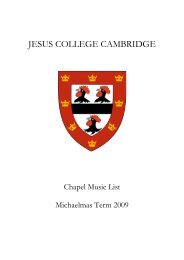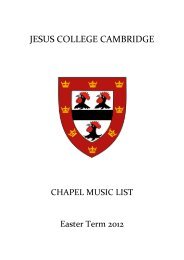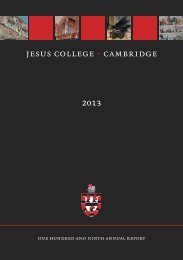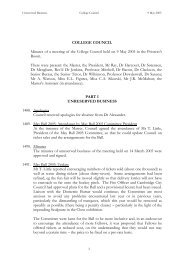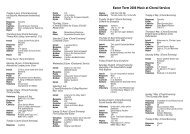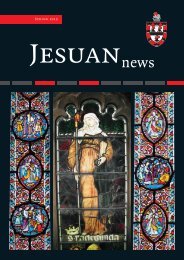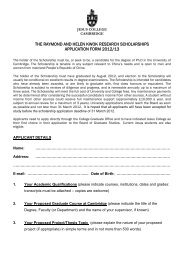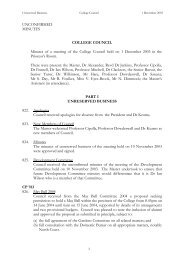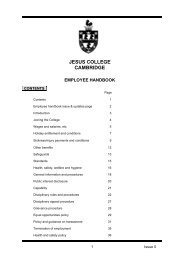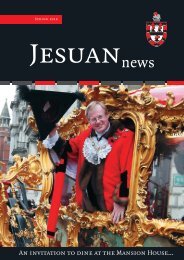2012 Annual Report - Jesus College - University of Cambridge
2012 Annual Report - Jesus College - University of Cambridge
2012 Annual Report - Jesus College - University of Cambridge
You also want an ePaper? Increase the reach of your titles
YUMPU automatically turns print PDFs into web optimized ePapers that Google loves.
Left-Handed Letters<br />
Christopher Burlinson<br />
ENGLISH STUDIES I <strong>Jesus</strong> <strong>College</strong> <strong>Annual</strong> <strong>Report</strong> <strong>2012</strong> 25<br />
O n 3 November 1579, the lawyer and pamphleteer John Stubbs was brought from the<br />
Tower <strong>of</strong> London to Westminster, where his right hand was publicly chopped <strong>of</strong>f.<br />
Earlier that year, he had published The Discovery <strong>of</strong> a Gaping Gulf whereinto England is Like to be<br />
Swallowed by an Other French Marriage, an eighty-page pamphlet sharply criticising the<br />
possible marriage between Queen Elizabeth and François, the catholic Duke <strong>of</strong> Anjou,<br />
which had been under negotiation for over a year. Stubbs’s pamphlet infuriated Elizabeth,<br />
who issued a proclamation condemning it as a “fardel <strong>of</strong> false reports, suggestions and<br />
manifest lies”. And as he stood on the scaffold awaiting his punishment (alongside<br />
William Page, his bookseller), Stubbs made use <strong>of</strong> the occasion to deliver a speech<br />
protesting his loyalty to the queen and urging his audience to “use your hands holily”. He<br />
subsequently told Sir Christopher Hatton, <strong>of</strong> the Privy Council, that after his mutilation<br />
he had cried “God save the Queen” before falling unconscious and being hauled back to<br />
the Tower; this story also appeared, with embellishment, in William Camden’s Annales:<br />
“I can remember that standing by John Stubbes, so soone as his right hand was <strong>of</strong>f, put <strong>of</strong>f<br />
his hat with the left, and cryed aloud, God saue the Queene”.<br />
I became interested in Stubbs in 2008, while studying sixteenth- and seventeenthcentury<br />
student notebooks in the British Library. In one particular book, among scores <strong>of</strong><br />
pages <strong>of</strong> theological notes probably compiled by a <strong>Cambridge</strong> student during the 1580s,<br />
I came across translations <strong>of</strong> twenty or so Psalms, apparently written by Stubbs and copied<br />
out about eleven years later, long after his death. They were signed ‘John Stubbs Scaeva’,<br />
a Latin nickname referring to Gaius Mucius Scaevola, a young Roman who in the sixth<br />
century BC had attempted to assassinate the King <strong>of</strong> the Etruscans, and who, when<br />
captured, had thrust his right hand into a fire to demonstrate his courage and devotion to<br />
Rome. The poems were preceded by a letter written to Stubbs’s brother-in-law, the famous<br />
Puritan divine Thomas Cartwright, who at that time was in Antwerp, taking up a position<br />
as preacher to a church <strong>of</strong> English merchants.<br />
Stubbs’s Psalm translations are not the most elegant <strong>of</strong> poems, and it is perhaps for<br />
that reason that they have never yet been studied (and barely even noticed by their<br />
librarians). But as I made the connection with the Stubbs <strong>of</strong> The Gaping Gulf, it became<br />
clear that they were an exciting find. Scholars <strong>of</strong> English literary history are currently<br />
fascinated by the various Psalm translations written by sixteenth-century prisoners in the<br />
Tower, to whom this book <strong>of</strong> the Bible seems to have allowed a shared voice <strong>of</strong> repentance<br />
and humility. And in spite <strong>of</strong> Stubbs’s occasional clumsiness, his letter to Cartwright<br />
actually speaks about his own poetry in an extremely thoughtful and self-conscious way,<br />
recalling other Protestant poets <strong>of</strong> the time – not least Edmund Spenser, who as a<br />
<strong>Cambridge</strong> student in the 1570s would have heard the Presbyterian lectures that led to<br />
Cartwright losing his university chair in divinity. Stubbs’s poems, then, provide further<br />
evidence about the debates on poetry, nationality, and godliness that were clearly animating<br />
<strong>Cambridge</strong> circles in the 1570s and 80s.<br />
As I continued to work on Stubbs’s Psalms and letters, in fact, I became even more<br />
interested in what they had to say about his place in those very Puritan circles – about<br />
the peculiar ways in which Protestants and Puritans might have corresponded with<br />
one another, and the place that godly poetry might have had in their exchanges and<br />
friendships.



